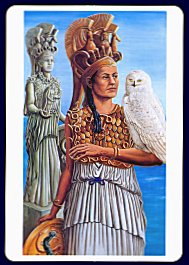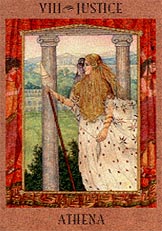|
Athena, along with Hestia and Artemis, is one of the three virgin goddesses of Olympus and one of the most powerful deities. Artisans, craftsmen, and tradesmen celebrated her as their teacher and patron, and the women of ancient Greece revered her as the teacher of all women's arts, such as cooking, weaving, and spinning. Athena is said to have invented the plow, the rake, the yoke, the bridle, the chariot, and the ship, as well as the flute and the trumpet. A supreme strategist, Athena is less of a warrior than a protector. Even though she is the goddess of war,
she receives no pleasure from battle. Rather, she enjoys her role as mediator, and prefers to settle disputes by upholding and interpreting the law. Not only do her judgments reveal great wisdom, they show great compassion and mercy as well.
Athena's father was Zeus, the mighty king of gods. One of his first loves was an ocean nymph named Metis. When Metis became pregnant, she told Zeus that the child she was bearing, which she expected to be a boy, would eventually dethrone him. Zeus was not going to take any risks, so he swallowed the pregnant Metis. Soon after, he developed such a terrible headache that he asked Prometheus, a Titan, to split open his head to relieve the pressure. From Zeus's split head emerged Athena, fully armed and fully clothed. She instantly became her father's favorite child, the only one who knew where his lightening bolts were hidden and the only one permitted to use his magically potent shield.
Athena is perhaps the most benevolent of goddesses. She has very few selfish, ulterior motives, and is almost always totally ethical. (Like most of her fellow deities, however, Athena was known to punish those who did not honor her.) The most famous example of her role as protector is her championship of the Greeks in the Trojan War, which, with Athena's help, the Greeks eventually won. Athena became a "cheerleader" for various heroes, helping them to win their battles, accomplish their tasks and achieve greatness.
|
 |
|
|  |
|

Fast Facts on: Athena (Athene), Goddess of WisdomAppearance: A young woman wearing a helmet and holding a shield.
Symbol or Attribute: Owl, signifying watchfulness and wisdom.
Strengths: Rational, intelligent, a powerful defender in war but also a potent peacemaker.
Weaknesses: Reason rules her; she is not usually emotional or compassionate.
Birthplace: From the forehead of her father Zeus.
Spouse: None.
Children: None.
Some Major Temple Sites: Athens, which is named after her. The Parthenon is her best-known, and best-preserved, temple.
Basic Story: Athena was born fully-armed from the forehead of her father Zeus - according to one story, this is because he swallowed her mother, Metis, while she was pregnant with Athena. Although Zeus's daughter, she could also oppose his plans and conspire against him.
Athena and her uncle, the sea god Poseidon, competed for the affections of the Greeks, each providing one gift to the nation. Poseidon provided a wonderful horse, but Athena provided the olive tree, giving shade, oil, and olives. The Greeks preferred her gift and named the city after her.
Interesting Fact: One of her epithets (titles) is "Grey-eyed". Her gift to the Greeks was the useful olive tree. The underside of the olive tree's leaf is grey, and when the wind lifts the leaves, it shows Athena's many "eyes".

|
 |
|
|